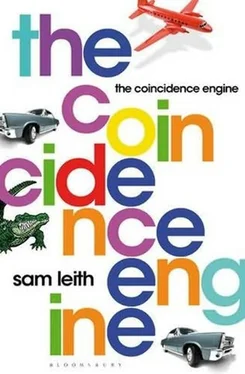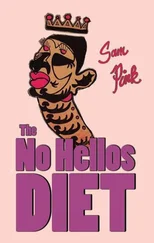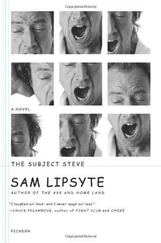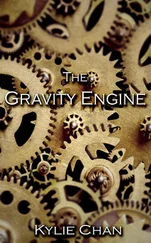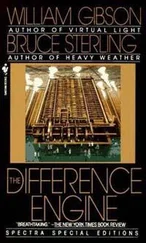Hands had the face of a man in whom panic and bewilderment were wrestling like drunken teenagers at a pyjama party.
‘But I don’t know anything about this – event, as you call it. This document: I should have told you what it was but I was, I don’t know, embarrassed. It’s -’
‘It’s an exact description of the formation of an airplane out of a junkyard!’
‘It’s fiction!’
‘Professor Hands, I put it to you that it is not. Look.’ Red Queen’s hand stabbed, again, at the blurry satellite photograph. ‘That is an airplane. Right there. In Alabama backcountry. An airplane.’
‘No, I mean this has nothing to do with anything. The passage you read, yes, I wrote it. But years ago.’ The professor took his glasses off and started to clean them. The pink on his skin had intensified to the point where it was coming out in creamy spots of white at the cheeks and the angles of his forehead. ‘I wrote that a decade ago or more. It’s fiction . I was trying to write a science-fiction novel – I, I don’t know. Call it a jeu d’esprit . It’s silly. Pure nonsense. It was about someone who builds a sort of magic probability machine. That was the first page.’
‘A novel. Like a what – like you’d buy in a bookstore?’ said Red Queen, who knew perfectly well what a novel was, and didn’t want to bother to pretend not to know what a jeu d’esprit was.
‘Yes,’ Hands, now a little piqued. ‘With pages and writing. Just like you’ve probably seen on TV.’ He regrouped, replaced his glasses. ‘Mine never got as far as the bookstore stage. I considered self-publishing, but after I’d had rejection letters from a number of agents I decided that, probably, I was a mathematician not an artist.’
The panic was leaving him. What he said next was tinged with something almost wistful.
‘I loved – as a child – loved reading science fiction. I was of that generation of children for who Einstein was a hero – and the lunar landings. I ended up in pure math – and that’s a whole other story – but it was science fiction that got me on the path. I had the idea I could do it myself.’ He pursed his lips a little. ‘Evidently, I couldn’t.’ After leaving it for a little while, he said: ‘So, where did you get this from?’
‘Nowhere, more or less. It was highly corrupt when it came in. From general surveillance. We think it was originally a fax, but it was impossible to isolate where it was coming from or where it was going.’
‘Well,’ said Hands, ‘I can tell you for sure that it’s nothing to do with me that it’s come to you. My only remaining copy of the manuscript has been in a cardboard box in my garage in Cambridge for years, and is likely to remain there.’
Red Queen put on a mulling-it-over face. It was possible Hands was lying, though it seemed unlikely, and trying to work out what truth he was lying to conceal was the high road to a migraine. If this was an eyewitness account, it would have had to have been from someone standing in the middle of a hurricane. And detail after detail didn’t make sense. How could they have heard the noise above the wind?
Red Queen felt irritable; then, not.
‘So this thing was written ten years ago?’
‘At least. At least.’
‘Yet it describes exactly what happened in Alabama.’
‘No. It describes exactly what I invented ten years ago,’ said Hands prissily. ‘It’s only you who says this thing has happened with the airplane – and only this satellite picture as evidence.’
‘Let us say it describes what happened.’
‘It had an unreliable narrator.’
‘Zip it. It describes what happened. And less than a week after what happened happened, someone transmitted it and it came to us. Doesn’t it slightly stretch credibility to imagine that this is a coincidence?’
‘Ah,’ said Hands. ‘I think I see what you’re driving at.’
Red Queen let him run. It seemed worth giving him a little satisfaction, a moment of control.
‘So you’re saying,’ said Hands, ‘that a document describing an imaginary coincidence engine, arriving just after something that might be a real coincidence engine takes effect, is proof that the real coincidence engine actually exists?’
‘We work with what we’ve got,’ said Red Queen.
Jones and Bree had spent the morning doing what Bree thought of as old-fashioned detective work, not that she had ever been a detective. The Mobile line of enquiry having gone nowhere, Red Queen had now told her to find this kid from England who they knew ‘the other side’ was looking for. Bree didn’t ask who ‘the other side’ was; in the DEI it could mean anything.
Red Queen had shuffled the DEI’s ring of skeleton keys and pulled passenger manifests for commercial flights out of Atlanta. He had been supposed to be on a flight. They had staked out the airport. He hadn’t showed up. Red Queen had also slipped into the Customs and Immigration database and found the photograph they’d taken at border control in Atlanta when he’d got off his plane from England. It showed a lean, long-jawed young man. Early twenties, tired-looking, perhaps from the flight. Tousled blond hair, a slightly off-centre nose. This was an improvement on the photograph on his Facebook profile, which was a picture of a duck.
There had also been a few frames grabbed from the CCTV in the luggage hall. In one of them he walked in – you could only see the back of his head because of the positioning of the camera – and crossed to the luggage carousel, where he stood unhelpfully behind a pillar. He had been carrying a briefcase – apparently his hand luggage from the plane – but what he fished off the carousel had been a backpack. It had seemed odd, to Bree – people who travel with backpacks don’t usually have briefcases as their hand luggage. The camera had lost him as he went through customs.
There was one more of him getting into a taxi at the rank outside the airport. He still had the backpack on him, and a fanny pack round his waist. But no briefcase. Bree had pointed it out when the pictures came through.
‘I know,’ Red Queen had said. ‘We’re working on that end of it. You stay on Smart. Don’t approach him for the moment. Just find him, and stay on him, and as soon as you do, tell me. If he’s got this thing on him, he could be… unpredictable.’
Alex Smart’s ‘unpredictability’ was the reason, according to Red Queen, that Bree had been teamed with Jones. The current thinking about this thing, if it existed at all, which Bree somewhat doubted, was that it was somehow affected by what people around it expected.
‘Do you know about the observer’s paradox?’ Red Queen asked.
‘Is that the one with the cat in a box?’ Bree said.
‘I’ve got people here who know all about it. Essentially, it says that you affect something by looking at it. Or you can’t look at something without affecting it.’
‘How’s that?’
‘I’m not the expert. It’s something to do with physics.’
‘If you stare into the abyss, the abyss also stares into you,’ Bree said.
‘You’re joking,’ Red Queen said.
‘Yes,’ Bree said. ‘I am joking. Tell me about the observer’s paradox.’
Bree felt annoyance in the quality of the pause. Bree didn’t know, quite, why she felt the need to get on Red Queen’s nerves, but she knew that her boss seemed to be unusually tolerant of it. It was, perhaps, the nature of the work they did: facetiousness was a way of expressing scepticism. Too much DEI stuff head-on and you started circling the plughole. The material you were dealing with started to seem plausible. You didn’t want to end up in one of the deep levels, gibbering about impossible angles, elder gods and colours unknown to man.
Читать дальше
